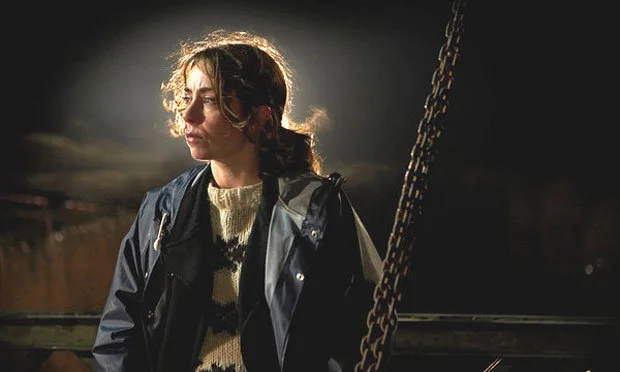Sofie Gråbøl, the celebrated knitwear model
We succumbed to the box set and addictively worked our way through the 20 hours of The Killing, a Danish crime series from 2007.
A young woman, Nanna Birk Larsen, has been found raped and murdered. DCI Sarah Lund investigates her murders and discovers a whole series of plausible murderers, including her teacher, a family friend, and the up-and-coming candidate for mayor.
It’s beautifully shot and very exciting and the cliffhanger endings are always thrilling. In some ways watching it in a box set is the wrong thing to do because it works best, I imagine, if you have to wait for each episode. And also when you watch them virtually back to back, the twists, the numerous suspects can occasionally get a bit ridiculous. And don’t listen to the people who says that it in any way subverts the crime drama or avoids the cliches; it’s full of cliches, but hey, it’s a whodunnit and a thriller. These genres have rules.
That said, I do think there are two very distinctive things about the series. The first is how mature and unsensational is its handling of character. In fact - rather formulaically - each episode proceeds rather slowly, lingering over the characters and their relationships, the camera taking in tautening of skin, momentary glances, stillness. For me the main beneficiaries of this are the dead girl’s parents, Pernille and Theis. They are a lower-middle class couple and we see them from happiness to despair, into revenge, breakdown, break up, reconciliation, hope, love and tragedy. Theis is a man of few words. Pernille has a strong, mature expressive face. Many of her most eloquent moments are glances, looks. In the depths of her despair, her eyes roam sightlessly around, looking for an explanation, an answer, her daughter.
The second thing is that everyone behaves honourably. I suppose I mean by this that the characters are not driven quickly into excess, vengeance, underhand behaviour. There are exceptions, early on, when Nanna’s teacher from an immigrant family - a low level of racial tensions rumbles through it - is suspected, Theis goes to take vigilante action. Later Pernille has a kind of breakdown and almost sleeps with a stranger. There are other examples, but by and large we watch people in extremely difficult situations trying to do the right thing, rather than fighting fire, as it were, with fire. Sarah’s relationship with her colleague and successor is beautifully sketched, from early hostility to genuine affection in a terribly truthful way.
I was struck by this because the telescoped narratives of mainstream cinema drive the characters quickly to reveal secret selves; the good man who crumbles under pressure, the strong woman who babbles for support, the priest who is quick to lie, cheat and steal. These things can happen, of course, but not always. Here we see characters like the mayoral challenger Troels Hartmann trying to hold his life together, do the right thing by his campaign and the police and the press. He makes mistakes but ultimately they seem to be honest mistakes.
And right at the heart of the show is Sarah Lund, played hauntingly by Sofie Gråbøl. Apparently, she was involved in the creation of the character and asked for someone serious, sombre, who was not defined by men. (That last reminiscent of the request Lisa Dillon made of David Eldridge.) This she manages. Her relationships does hit problems, but no one behaves unreasonably (okay, maybe her mother, but that portrait is also terribly true). She’s intuitive, but thoughtful; there are no magic solutions. She makes a lot of mistakes. She’s a beautiful observer of human darkness, deep black eyes, frowning over the puzzles in the story.
That said, what drives the story finally is the opposite. The ending - to give nothing away - reminds me of Se7en, a challenge to someone who has tried to behave honourably, to maintain perspective and decency, to cross a line. And you notice that in the other stories too there are compromises, finally, that the world has been sullied just a little, that everyone has shifted. And that’s perhaps its most powerful statement; it’s a personal vision and a social vision. Not pessimistic, but clear-eyed to the ways we can fall.






![photo[1].jpg](https://images.squarespace-cdn.com/content/v1/513c543ce4b0abff73bc0a82/1362919072201-PZO854G4SEB794DVOEI8/photo%5B1%5D.jpg)
